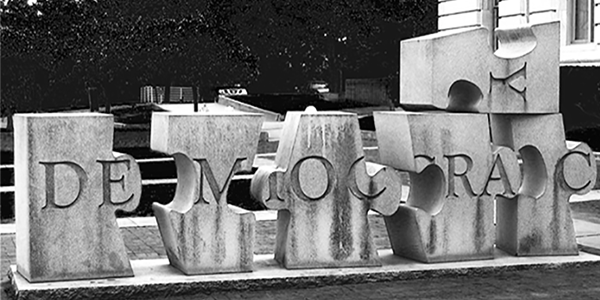Democracy in small states: why everything we think we know about democratisation is (mostly) wrong
Why do small states often rank highly in comparative measures of democracy? Jack Corbett and Wouter Veenendaal outline how their research into states with populations under one million challenges existing theories of why democracies can persist or fail.
 Picture: Sara, via a (CC BY-NC-SA 2.0) licence
Picture: Sara, via a (CC BY-NC-SA 2.0) licence
For at least half a century, scholars have grappled with the complex and dynamic process that we commonly call democratisation. Over this period, numerous theories have been advanced to explain why democratic transitions occur and persist in some countries but not in others. Collectively, political science has found that democratic transition and consolidation is more likely to succeed in wealthy countries, with homogenous populations, a British colonial legacy, stable and strongly institutionalised party systems, and those with particular geographical features (being an island and the presence of democratic neighbours).
Despite the considerable resources and intellectual effort expended in pursuit of this scholarly and practical endeavour, small states, which account for roughly 20% of the world’s countries, have been routinely overlooked. We know that small states are more likely than large ones to score well in Freedom House rankings. But, aside from Freedom House, the other major democracy datasets – Polity IV and The Economist’s Democracy Index – exclude many of them. As a result, virtually all scholars in the field of comparative politics and democratisation have overlooked these cases and so almost everything that we think we know about democratic transition and consolidation suffers from an unstated gigantism. Addressing this gap in order to bring small states into conversation with democratisation theory for the first time was the task we set ourselves in our new book Democracy in Small States: Persisting Against All Odds.
The implications of excluding small states can be observed in Huntington’s (1991) classic The Third Wave, in which he famously observed that the democratic transition of some thirty countries in Latin America, Southern and Eastern Europe, Asia, and Africa between 1974 and 1990 resulted in a global increase in the number of democracies. However, in making this claim Huntington excluded countries with populations of less than one million (p. 43). If he had included all available countries that became democratic between 1974 and 1990, the number of democratising states would have risen from 36 to 56, according to the Freedom House rankings. Initially, utilising the full sample rather than just over half of the available dataset would have significantly bolstered Huntington’s claims about the historical significance of the Third Wave.
The full impact of excluding small states, however, is demonstrated by the way it has biased the subsequent Huntington-inspired literature on global democratisation trends. At the dawn of the new millennium it became apparent that many of the states Huntington classified as Third Wave cases remained stuck in the ‘grey zone’ between democracy and authoritarianism, and some even slid back to outright dictatorship. The expected transition to liberal democracy did not materialise in many countries, and some scholars even suggested that a third ‘reverse wave’ might follow. However, if the experience of the 20 excluded small states from that period were taken into account, this so-called ‘reversal’ is far less significant than these studies presume. In fact, with the exception of Fiji, which returned to democracy in 2014, but has experienced successive coups since the late 1980s, none of the Third Wave cases that Huntington excluded has reverted to authoritarianism.
We set out to study the group of 39 states with populations of less than one million commonly excluded by scholars like Huntington but statistically much more likely to be democratic than larger states. Freedom House ranks the majority as democratic, but small states are also home to some of the world’s last remaining monarchies. They vary substantially along all factors commonly employed by scholars to explain why regimes rise and fall: they can be both very rich and very poor; have either the most ethnically homogenous or diverse populations; and can have extremely polarised party systems, or no parties at all. Colonial legacy looms large in our story but some small states were never colonised. Many are located near powerful neighbours that influence their politics while others are among the most isolated countries on earth. Formal institutions are similarly varied. Westminster is the most common parliamentary setup but small states host the full spectrum of institutional designs, and some of them have political systems that have never been trialled elsewhere. As a result, despite their essential ‘smallness’ it is difficult to conceive of a more ‘different’ group of countries than those we cover here.
The book sets out to explain why small states are more democratic than large ones by testing their experience against existing democratisation theories. We employ a mixture of quantitative and qualitative data. Contra received wisdom, we find that the standard theoretical explanations of democratic transition and consolidation – economic growth; cultural fragmentation; colonial legacy and institutional design; the presence of an institutionalised party system; or geographic location – do not appear to have explanatory power in small states. That is, they explain neither the democratic successes nor failures. By illustrating that existing theory does not explain such a large number of (small) cases, we offer a powerful challenge to received wisdom on the causes of democratisation.
The implications of our theory testing move are of immense importance to questions about regime stability and democratic consolidation in particular. Our analysis shows that decades of research that underpin a series of painstakingly compiled law-like generalisations about when democracy can survive, fail the most basic empirical examination. This point is of immediate practical relevance to anybody interested in democracy promotion around the globe. By prescribing a series of necessary and sufficient preconditions that must be in place before democratisation will succeed, existing theory has inadvertently served to limit the possibilities we assign to democracy. Our research shows that democratic government is actually far more resilient than is commonly presumed. At the same time, we also show that democracy in small states works quite differently than in large ones, underscoring the adaptability of this regime form. Our analysis therefore offers a distinctly optimistic message for all of those who believe in the promise of representative government at a time when liberal institutions appear to be under considerable threat.
The payoff from including small states is therefore a much more nuanced and clear-eyed assessment of the promises and limitations of different regime types. For democratisation scholars, this analysis deepens our understanding of one of the field’s long-standing puzzles – why small states do so well in the Freedom House rankings. Given that democracy appears to be at the crossroads, we need to better understand its persistence in a range of settings, not just a few large and rich states. Moreover, to meet the standard conventions of case selection – representativeness and variation – we argue that comparative scholars need to pay closer attention to small states. In doing so we gain a more holistic view of democratic practices, appreciate democracy’s great diversity and capacity to adapt, but also recognise its limitations and the reasons that underpin when and how it survives or fails.
This article represents the views of the authors and not those of Democratic Audit.
Democracy in Small States: Persisting Against All Odds is published by Oxford University Press. The book will be launched at the Centre for Small States at QMUL on 18 October 2018. If you would like to attend please register here.
About the authors
 Jack Corbett is Professor of Politics at the University of Southampton.
Jack Corbett is Professor of Politics at the University of Southampton.
 Wouter Veenendaal is Assistant Professor at Leiden University.
Wouter Veenendaal is Assistant Professor at Leiden University.





 Democratic Audit's core funding is provided by the Joseph Rowntree Charitable Trust. Additional funding is provided by the London School of Economics.
Democratic Audit's core funding is provided by the Joseph Rowntree Charitable Trust. Additional funding is provided by the London School of Economics.